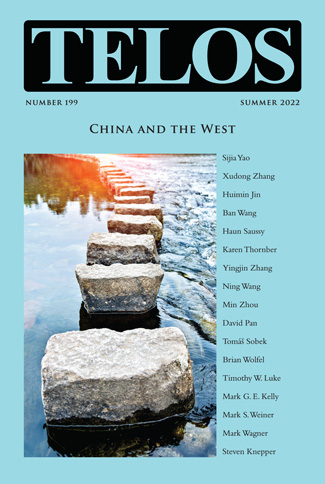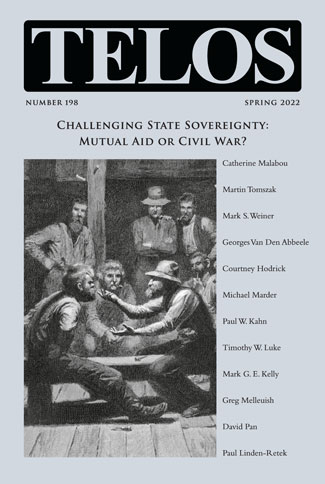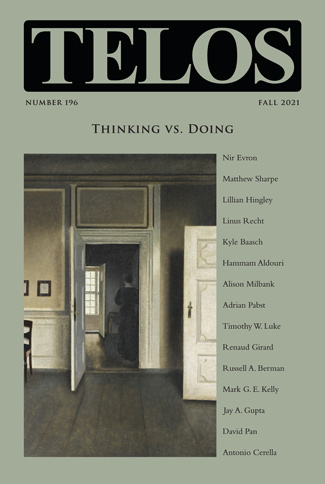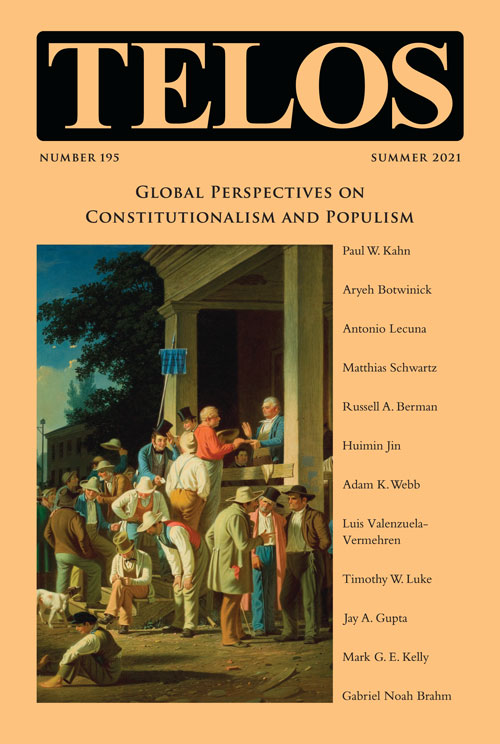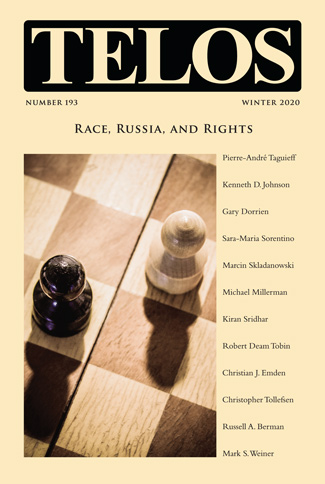 The extended nature of the war in Ukraine stems from the long-term political and ideological developments that have led up to it and will continue to dominate it. In Russia, the government has maintained support for the war through the promotion of a civilizational narrative about Russian culture that has been established over the last twenty years. As Marcin Skladanowski describes in “Criticism of Western Liberal Democracy by Patriarch Kirill of Moscow and All Rus'” (Telos 193), the Russian Orthodox Church has set up the conflict between Russia and the West as a moral one, in which Russia defends a divinely grounded morality against the amoral secularism of the West. This religiously grounded idea of a civilizational conflict exists alongside a philosophical explanation. In “The Ethnosociological and Existential Dimensions of Alexander Dugin’s Populism” (Telos 193), Michael Millerman describes Dugin’s Heideggerian attempt to establish civilizational differences between peoples as the basis for an anthropological theory of human existence. As Nikolai-Klaus von Kreitor recounts in “Elements of the New Russian Nationalism” (Telos 96), Dugin was already at work in the early 1990s on such ideas when he developed Carl Schmitt’s theory of the Grossraum in order to criticize U.S. imperialism and justify a Eurasian regional hegemony to counter the dominance of the Western liberal order.
The extended nature of the war in Ukraine stems from the long-term political and ideological developments that have led up to it and will continue to dominate it. In Russia, the government has maintained support for the war through the promotion of a civilizational narrative about Russian culture that has been established over the last twenty years. As Marcin Skladanowski describes in “Criticism of Western Liberal Democracy by Patriarch Kirill of Moscow and All Rus'” (Telos 193), the Russian Orthodox Church has set up the conflict between Russia and the West as a moral one, in which Russia defends a divinely grounded morality against the amoral secularism of the West. This religiously grounded idea of a civilizational conflict exists alongside a philosophical explanation. In “The Ethnosociological and Existential Dimensions of Alexander Dugin’s Populism” (Telos 193), Michael Millerman describes Dugin’s Heideggerian attempt to establish civilizational differences between peoples as the basis for an anthropological theory of human existence. As Nikolai-Klaus von Kreitor recounts in “Elements of the New Russian Nationalism” (Telos 96), Dugin was already at work in the early 1990s on such ideas when he developed Carl Schmitt’s theory of the Grossraum in order to criticize U.S. imperialism and justify a Eurasian regional hegemony to counter the dominance of the Western liberal order.
|
Telos 199 (Summer 2022): China and the West is now available for purchase in our store. Individual subscriptions to Telos are also available in both print and online formats.
It would be a mistake, though, to see China and the West as polar opposites or competing civilizations, separated by their opposing political interests on the one hand and by the history of each of their cultural traditions on the other hand. Even if they had separate long histories, the recent past has seen many more opportunities for interaction and orientation around common projects and problems. Moreover, since the past is always a projection from out of the present, the idea of a clash of civilizations is not a legacy but a project. An alternative endeavor would be to conceive of the relationship between China and the West as existing within a larger totality. The definition of such a totality must occur within a particular perspective, however, and therein lies the problem. China and the West are clearly competing to define the framework of global order. Consequently, any attempt to consider the relationship between the two must look to the vision of universality that each side is trying to establish against the other. This issue of Telos considers a variety of ways of defining the overarching perspective from which the comparison between China and the West makes sense. Telos 198 (Spring 2022): Challenging State Sovereignty: Mutual Aid or Civil War? is now available for purchase in our store. Individual subscriptions to Telos are also available in both print and online formats.
In spite of this fragmentation, though, there are two main concerns that are shared. In the first place, there seems to be a general recognition among these different perspectives that the inhabitants of a state are not completely homogeneous and that the internal heterogeneity of a state should be at least in part the basis for domestic order. If libertarians prefer market-based structures and traditional conservatives look to family and religion, liberals seem to have gravitated toward identity-based groupings, and anarchists might prefer mutual aid organizations as independent places of sovereignty within which individuals can define themselves. The disagreements concern the type of heterogeneity that is being called for as well as the precise mechanisms for supporting diverse organizations within the state. Telos 196 (Fall 2021): Thinking vs. Doing is now available for purchase in our store. Individual subscriptions to Telos are also available in both print and online formats.
The following commentary is based on a text that appeared originally in German in Junge Freiheit. An English translation of the interview with Hans-Georg Maaßen in Die Weltwoche has been posted separately today in TelosScope, here. The interview with Hans-Georg Maaßen documents his reactions toward the charge of anti-Semitism against him by several German media outlets in the last few weeks since he announced his candidacy for the German Bundestag. The controversy has revealed more about the deterioration of the German media landscape than about Maaßen’s own views and character. Spurred on by a charge against him of racism and anti-Semitism by climate activist Luisa Neubauer on ARD’s political talk show Anna Will, media outlets scoured Maaßen’s writings with the hope of giving their accusations some substance. The dearth of the evidence against him led them in the end to an article that he published with Johannes Eisleben in English in TelosScope. But rather than engaging with the specific arguments of the article, the commentators have engaged in a kind of witch hunt. Telos 195 (Summer 2021): Global Perspectives on Constitutionalism and Populism is now available for purchase in our store. Individual subscriptions to Telos are also available in both print and online formats.
|
||||
|
Telos Press Publishing · PO Box 811 · Candor, NY 13743 · Phone: 212-228-6479 Privacy Policy · Data Protection Copyright © 2024 Telos Press Publishing · All Rights Reserved |
||||
